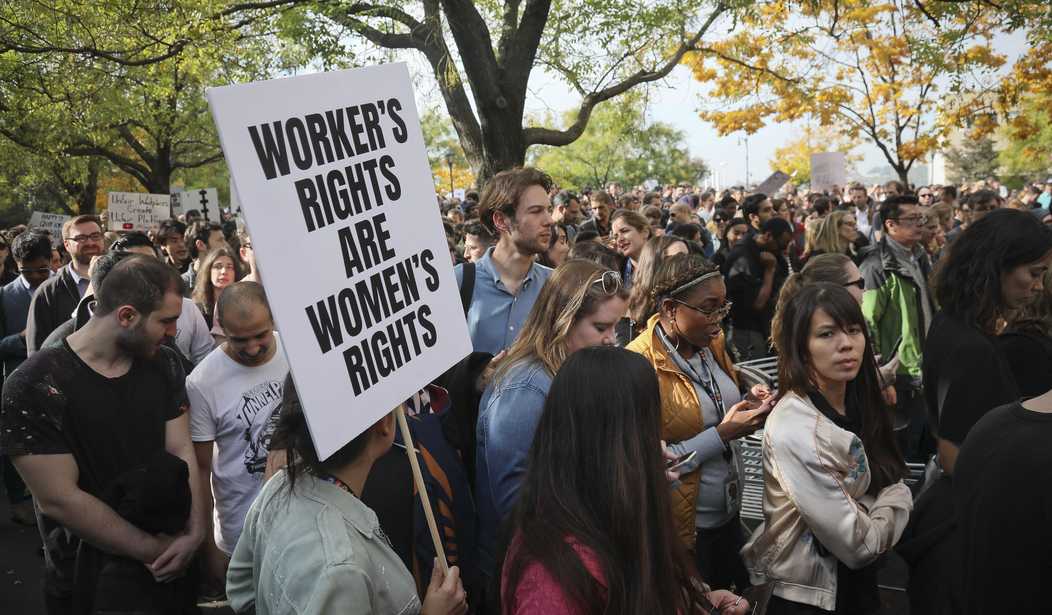Following waves of unruly activity in the streets of London and other British cities, Parliament passed strict new laws cracking down on the activities of those causing damage or disrupting the normal ebb and flow of commerce and society in general. Those of us who have been watching similar activity taking place in the United States probably envied the Brits for having the gumption to attempt to restore order. But now, many activists are raising concerns that British law enforcement and the courts have gone too far, particularly when it comes to environmental protesters. People have been sent to prison this year for holding up signs in public or chanting, and some of the sentences have been rather lengthy. So is the British government “erasing the right to protest,” as some critics claim? Or do they just need to find a way to strike a balance while enforcing these new laws? (Associated Press)
For holding a sign outside a courthouse reminding jurors of their right to acquit defendants, a retiree faces up to two years in prison. For hanging a banner reading Just Stop Oil off a bridge, an engineer got a three-year prison sentence. Just for walking slowly down the street, scores of people have been arrested.
They are among hundreds of environmental activists arrested for peaceful demonstrations in the U.K., where tough new laws restrict the right to protest.
The Conservative government says the laws prevent extremist activists from hurting the economy and disrupting daily life. Critics say civil rights are being eroded without enough scrutiny from lawmakers or protection by the courts.
In attempting to sort this out, I believe it’s important for us to draw a distinction between protesting and rioting, as we’ve been forced to do in the United States. Protesting involves raising your voice and getting your message out to the public and elected officials. But when “raising your voice” morphs into raising your fist or a firebomb, your protest has turned into a riot. We had to learn that the hard way in 2020 while smirking legacy media reporters talked about “mostly peaceful protests” while literally standing in front of a police station that was going up in flames.
So what have the Brits been up to? It depends on which groups and which types of “protests” we’re talking about. The government had been receiving loud complaints about Extinction Rebellion and its members’ efforts to destroy precious works of art and close down businesses. However, other environmental protesters were more passive in their actions and adhered to the previous rules of the road for such demonstrations. Here’s one example from earlier this year where “Just Stop Oil” protesters managed to pull off a demonstration without things getting out of hand to any great degree. But they still did manage to shut down traffic in London for a period of time.
Which approach should have been taken with the protesters in that video? This isn’t a question of whether you agree with their goals or not. (I obviously don’t.) This is more a question of whether their actions were appropriate and didn’t excessively disrupt society or if some form of legal remedy was required. In all of these cases, as with much of Britain’s rather loosely structured legal system, the answer frequently comes down to who is enforcing the law at the moment and which court hears the case if one is brought.
One of Parliament’s new regulations created a statutory offense of “public nuisance” that can land someone behind bars for up to ten years. That sounds like a fairly long stretch for something that could be classified as a nuisance. There is a very significant difference between destroying a Rembrandt that could be worth millions of dollars or blocking a bus on the thoroughfare for ten minutes.
Take a look at some of the examples in the article linked above. There has been some outrageous behavior taking place to be sure, but other instances seem mild when compared to even some of the quieter riots we’ve seen over the Hamas war in America lately. As noted, one person was handed a two-year sentence for holding up a sign while another received three years for hanging a banner on a bridge. Prior to the new King’s coronation, six anti-monarchy protesters were arrested for simply showing up, though all were later released. One woman was arrested for silently praying in front of an abortion clinic. The charges were later dropped after a public outcry erupted, but she was threatened with up to five years in prison for praying silently. I hope we can all agree that her case was clearly a bridge too far.
Protesters who turn into rioters can definitely go too far and maintaining order and public safety is the job of the government. But the government can similarly go too far as well. In the United States, we try (and frequently fail) to maintain that delicate balance using challenges in the courts. The Brits have similar options to a certain degree, but if Big Daddy Government gets in too foul of a mood, they can still bring the hammer down on you with considerable force. Britain has long relied on its elected officials to act with restraint out of a sense of duty to do so, not because of any formal threats and directives in its founding documents. That theory may not last forever. Former Conservative justice minister David Lidington is quoted in this article as saying, “The ‘good chap’ theory of checks and balances has now been tested to destruction.” He may be proven correct before long.








